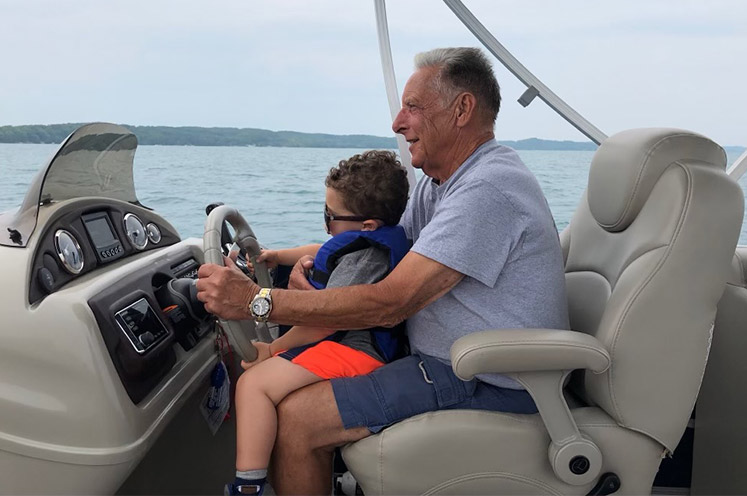Lung Cancer Screening Program
Lung cancer screening has shown that we can detect cancer much earlier in people most at risk.
 It’s the 1950s, guests are coming to young Ron’s home, and his mom gives him a chore: Fill several cups with cigarettes and place them around the living room for the guests. It’s 2021, Ron Loeb is 75, and he is dealing with the repercussions of a 60-year habit he’s tried to break “thousands” of times. Now, Henry Ford specialists will treat Ron for what he has feared for decades.
It’s the 1950s, guests are coming to young Ron’s home, and his mom gives him a chore: Fill several cups with cigarettes and place them around the living room for the guests. It’s 2021, Ron Loeb is 75, and he is dealing with the repercussions of a 60-year habit he’s tried to break “thousands” of times. Now, Henry Ford specialists will treat Ron for what he has feared for decades.
Ron is a retired investor who lives in a large Huntington Woods home with a swimming pool and two dogs – a place where he raised his three kids. Ron is also a golf maniac, an avid murder mystery reader and a crossword puzzle fan who loves sunrises and sunsets. He hopes that his future will provide many more.
A few years ago, a wise friend knew that Ron couldn’t stop smoking, so he pleaded with him to get an annual lung cancer CT scan of his lung. Ron agreed. On the fourth year, a small spot showed up. Looking for a second opinion and the best medical care, Ron went to the Henry Ford website and read about all the thoracic surgeons including Ikenna Okereke, M.D.
Lung cancer screening has shown that we can detect cancer much earlier in people most at risk.

The biggest advancement in lung cancer surgery has been minimally invasive surgery for tumor removal. Dr. Andrew Popoff, Thoracic Surgeon at Henry Ford Cancer discusses the benefits of minimally invasive procedures for lung cancer patients.
 “When I met Dr. Okereke, I thought he was awesome. He’s straightforward and honest. This man is like a god. He doesn’t mollycoddle anything,” says Ron. “My wife and I were very comfortable, so we made a decision to go with him.”
“When I met Dr. Okereke, I thought he was awesome. He’s straightforward and honest. This man is like a god. He doesn’t mollycoddle anything,” says Ron. “My wife and I were very comfortable, so we made a decision to go with him.”
During surgery to remove the lump, tissue was sent to a waiting pathologist to confirm the diagnosis. His lymph nodes were also checked to see if the cancer had spread. Then the Stage I, non-small cell lung cancer and the upper lobe of his lung were removed. The middle and lower lobes were spared.
“The surgery took about 90 minutes and was fairly straightforward,” says Dr. Okereke. “At Henry Ford, we do a high percentage of minimally invasive surgeries which allows for faster recovery.”
“Dr. Okereke was phenomenal, and he surrounds himself with phenomenal people. He set the standard for everyone – from the receptionist to the P.A. and the resident,” says Ron.
On the evening of the surgery, Ron was in severe pain and aware of tossing and turning, but he doesn’t recall complaining aloud. A nurse came in the room and said he wasn’t getting any relief from the pain medication, so she administered another drug though his IV.
“After that, she put her arm around me and literally held me until I fell asleep,” says Ron. “I was conscious enough to be aware of the tender care she was giving me. It was a very positive experience. I was very impressed.”
 Within three days, he was at home starting his daily 30-minute walking routine. “Walking is the key to my recovery,” says Ron who has shortness of breath and COPD from smoking.
Within three days, he was at home starting his daily 30-minute walking routine. “Walking is the key to my recovery,” says Ron who has shortness of breath and COPD from smoking.
“All I could say was ‘I hope so,’” says Ron.
For Ron, the 60-year addiction doesn’t stop easily. “Soon after the surgery, I was dying for a cigarette and found a pack in my drawer. I went for a walk, lit a cigarette and started gagging,” says Ron. He credits the gag response to an under-to-lip nicotine pouch provided by his son.
“Any time a person stops smoking, there’s a benefit – even if someone has been smoking for decades,” says Dr. Okereke.
Ron’s advice to anyone and especially to his grandson? “I wasn’t very smart about smoking. Don’t consider doing it.”
Ron’s future: “I want to get to my grandson’s bar mitzvah. I’ll be 83 then.”
We use cookies to improve your website experience. By using this site, you agree to our Terms of Use. Read our Internet Privacy Statement to learn what information we collect and how we use it.